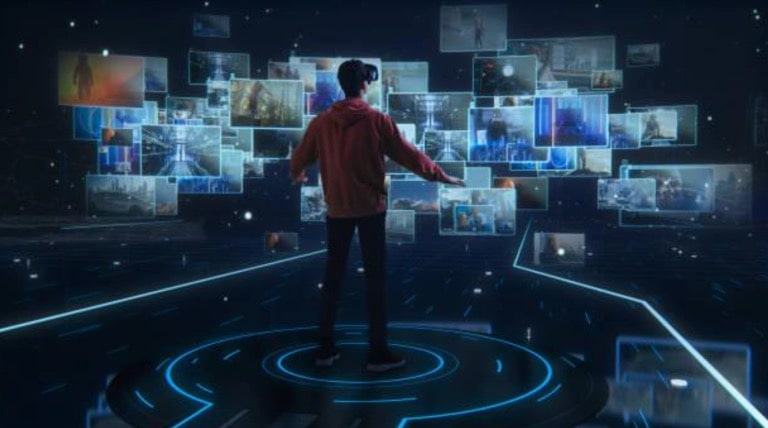Future Virtual Evolution: How Internet Technology Has Changed the Entertainment Industry?

“Modern technology has become a total phenomenon for civilization, the defining force of a new social order in which efficiency is no longer an option but a necessity imposed on all human activity.” – Jacques Ellul
Embracing technology is no longer an option in the current digital age but a necessity as advancements in digital technology continue to change every aspect of life.
The media and entertainment industry, which technology has overhauled for good, is not left out.
Today, the advent of sophisticated cameras, CGI technology, and AI-powered tools has impacted the way content is produced, shared, and distributed.
This piece provides a lowdown on the most notable impacts of digital technology in entertainment. Let’s dive in.

The Impact of Internet Technology on the Entertainment Industry
Digital technology has left its mark on the entire entertainment industry sector, from filmmaking, TV, and live performances to gaming and sports.
Here are 3 of the most significant effects of technology on the entertainment landscape.
Enhanced content quality
Technological advancement has significantly improved the quality of movies and music from what it used to be
In the past, movies used to be in the form of silent films with no sound or color effects. This era of filmmaking limited movies to mere visual stories.
But as technology advanced, sophisticated cameras were produced. Gradually, audio, color, and different visual effects found their way into films. This enables content creators to create high-quality, human-like characters and real-life scenes and tell more vivid and immersive stories that captivate audiences.
Decentralized Accessibility
Not so long ago, movies and music were recorded on cassette and vinyl records. This means only the elite few with enough money to splurge on entertainment could access the latest release.
Technological advancement has changed this for the better. Now, movies and music are available online on various streaming platforms and distribution channels like Netflix, Prime Video, Apple+, and Spotify.
As a result, anyone from anywhere can now watch any movies or listen to music from their favorite artist on the go.
Also, thanks to the rise of the 5G network, video streaming is now seamless and hitch-free.
Improved Gaming Experience and Proliferation of eSport
Many people love to play games at leisure to pass the time. The advancement of technology has pushed the boundaries of gaming even further, making it more fun, competitive, and profitable.
As technology evolves, there are now several genres of captivating games with high-resolution and immersive experiences. There is also no shortage of game consoles and PCs to give players unparalleled excitement and a smooth gaming experience.
“Virtual Reality is really a new communication platform. By feeling truly present, you can share unbounded spaces and experiences with the people in your life. Imagine sharing not just moments with your friends online, but entire experiences and adventures.” — Mark Zuckerberg.
With the rise of AR and VR headsets and glasses, the days of gamers sitting passively behind the screen are gone. Avid gamers can now interact with game characters in real-time. All of this gives way to a more immersive user experience.
However, technology does not just streamline traditional gaming; it is also birthing novel kinds of games. One such example is esports – a form of entertainment where avid gamers around the world compete with each other virtually.
The 2023 League of Legends global tourney saw a viewership of over 6.4 million at its summit. Since this competition attracts captivating prizes, technology and live streaming, in particular, have made games not just a pastime activity but also a way to make a good living.
Another innovation of technology in gaming is drone soccer. This is a form of soccer powered by drones. The mission of this game is for the drone from one side to drift past the goal line of the opposing team (of drones) as many times as possible.
The Future of Media and Entertainment: Reasons Why Technology Changes Everything
As digital technology continues to transform everything in the digital era, here is a forecast of what the future of entertainment may look like:
Innovation Matters More Than Ever
As the transformative nature of technology continues to be felt across every aspect of the media and entertainment landscape, companies that want to stay relevant must embrace innovation now more than ever.
This can mean testing new technologies like generative AI, robotics, and drones in their business operation. Robotics are now used for the execution of various tasks at live shows in MSG Sphere in Las Vegas. AI-powered video generators can now write new movies from scratch after providing a few contexts and prompts.
Even the iGaming industry in the UAE has not been spared by artificial intelligence. It is capable of predicting sporting events. With full access to all the necessary data, AI can compete with the best sports analysts. Based on a team’s recent history, as well as the history of meetings between the two teams and a few other indicators, AI can predict which team will prevail.
With the help of AI, you can act as a sports analyst too. Collect the statistics of goals between your favorite teams. After that, check out 1xbet legal in UAE and bet on your favorite team.
Profitability – Not Revenue- Takes Top Priority
The massive wave of live streaming services is popularizing the fact that it is possible to drive more profit from the same product line.
This is exactly why more entertainers are going for revenue streams and business models that drive more profits.
One such example is the cable Television industry going into video streaming in order to generate new revenue streams through subscriptions and in-app advertisements.
Greater Diversity and Inclusion is a Business Imperative – and Data Is Key

Consumer expectations are changing. People no longer watch movies or listen to music solely to cure boredom. Instead, they now consume entertainment for self-gratification and to fulfill various personal needs and desires.
What does this tell us? When consumers watch movies, they want to learn new and trendy concepts, satisfy certain fantasies, or immerse themselves in various cultures and times in history.
This begs the need for diversity and inclusion in the filmmaking and entertainment industry at large. Movies like Bridgerton and Squid Game that get this right are fan favorites globally.
To make more inclusive movies, content creators must embrace data analytics to uncover consumer expectations and audience preferences. Streaming video platforms like Netflix and Spotify already leverage predictive AI algorithms and machine learning to personalize movie recommendations. This data-driven approach to decision making and movie recommendation has increased app usage, taking the number of people that subscribe and revenue to new highs.
M&A and Strategic Partnerships Heat Up
In order to reach new audiences, we are seeing more media companies merging with themselves to run a lap around incumbents streaming services.
One of the most popular mergers in recent times was the partnership between WarnerMedia and Discovery, Inc.
With this acquisition, both companies hope to fastrack their speed of producing rich and diverse content that resonates with consumers.
Similarly, video streaming platforms are also partnering with independent and lesser-known content creators in advanced and developing countries. This helps to enrich and diversify their content creation while also tapping into the audience of this creator to grow their reach and revenue streams.
Organization Embrace Nimble, Cross-Functional Systems
More companies in the entertainment and television industry are showing resilience to recent technological disruption through effective collaboration.
Think of the integration and fusion of Warner Bros, HBO, and Turner brands to formulate Warner Media as an example.
As technology continues to redefine and disrupt the entertainment industry, more and more teams are going to forge cross-functional alliances to accelerate growth and adapt to the new normal.
The Potential of Internet Technology in Film and Television
So far, there has been a massive transformation of the filmmaking and TV industry in the digital era.
Sophisticated cameras have birthed the creation of high-quality and stunning masterpieces that capture the creator’s experience vividly and captivate audiences.
As generative artificial intelligence evolves, storytelling will improve, forcing creators to push the boundaries of content creation to greater depth.
Also, recent developments in the field of augmented reality and virtual reality are already changing content creation and the way we consume and view movies. The recent Lion King, which features the integration of animation and VR to create life-like characters, is an example. Also, AR glasses are already making it possible for viewers to not just watch movies but participate actively in them.
All of this shows that the golden era of the digital revolution in the filmmaking industry is on the horizon, and the best way for content creators and box office heads to prepare for the future is to embrace innovation, diversity, and inclusion in filmmaking.





